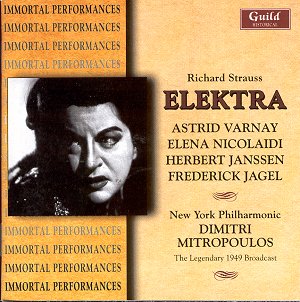Elekra is the opera chosen for inclusion
in the second tranche of this series. Even more extreme in its orchestral
texture and dissonances than the composer's Salome, the opera
is very much an acquired taste. Richard Caniell, progenitor of this
series, and to whom I owe an apology for misspelling his name in some
of my reviews of the first four issues in the series, provides a detailed
and informative essay on the opera itself and performances in the post-Second
World War era. Particularly, he puts into perspective both the anticipation,
and realisation, of this 1949 performance given to a packed Carnegie
Hall on, of all days considering the subject matter, December 25th.
Mitropoulos's searing account of the score is the stuff of legend and
can be heard in all its vitality in good sound. Regrettably it is not
textually complete. With several excisions it lasts 91 minutes.
The name part of Elektra is sung by Astrid Varnay.
It might be said she was to the Richard Strauss-Wagner repertoire what
Callas was to the belcanto-ists and Italian romantics. Flawed vocally,
in the purest terms, but one never left the theatre other than having
been fully involved in her interpretation. She always gave 100% and
then some. So it is here. Nicolaidi is a little stately as a Klytemnestra
who, as Caniell notes, sings rather than merely declaims her lines.
Janssen is imposing, if a little dry compared with his younger self.
The other parts are all at least adequately taken, with some contributions
inspired by the occasion and the conductor.
The recording derives from line transcription discs
which, whilst having been subjected to restorative techniques, have
not been filtered of grit or ticks (not that there are any particularly
intrusive ones) in order that the orchestral and vocal overtones are
not lost; nor is any electronic reverberation added.
There is 58 minutes of Varnay in a variety of arias
ranging from the showpiece from Oberon, via Senta's Ballad
and Voi che sapete to extracts from Boccanegra featuring
Richard Tucker and Leonard Warren. It is to be regretted that these
1950 Boccanegra extracts are in poor sound and the Met audiences
infuriating habit of applauding at inappropriate moments disturbs the
impact. However, in today's era when singers have clearly defined fachs,
It is awesome that this account of Varnay's Amelia comes eight years
after her Met debut as Sieglinde (and which she followed six days later
with Brünnhilde) and whilst she was singing the heaviest dramatic
roles at the Met, Bayreuth, Florence etc. For those interested in the
evolution of operatic singing, these tracks alone are worth the bargain
price of this issue.
Strauss lovers will already have either, or both, Solti's
or Sinopoli's versions. They shouldn't hesitate to add this version
and then, as the examiner might say, compare and contrast. I say also
enjoy!
Robert J Farr
See also review by Peter
Quantrill


![]() See
what else is on offer
See
what else is on offer 